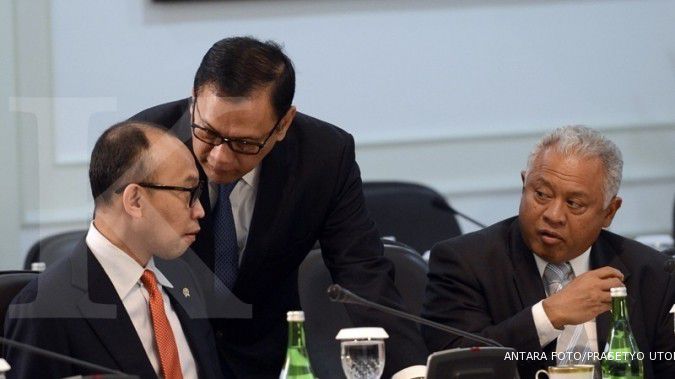JAKARTA. While the latest indicators show that inflation is falling and the trade balance posted a surprising surplus, the positive data could conceal underlying problems facing the Indonesian economy. The US$123 million trade surplus posted in July — which overturned a $305.1 million deficit a month earlier — was not caused by an improvement in exports. Overseas shipments dropped 6 percent year-on-year, but the trade balance stayed in positive territory only because imports nose-dived by 19 percent, the Central Statistics Agency (BPS) announced on Monday. The plunge in imports, the worst since the global financial crisis, might potentially indicate a sharp economic slowdown for Indonesia ahead, noted Chua Hak Bin, an economist with Bank of America Merrill Lynch. The imports drop was caused by reduced domestic purchases of machinery, mechanical tools, plastics, vehicles and automotive parts. “A small trade surplus masks sustained weakness in investment,” ANZ Bank economists Daniel Wilson and Glenn Maguire stated in a note distributed to clients on Monday. Indonesia’s economy grew by 5.1 percent in the second quarter, the slowest pace in almost five years, but ANZ Bank predicted that such a painful downturn might persist for some time due to the bleak outlook of investments, which account for more than 30 percent of the country’s gross domestic product (GDP). “We have held the view that the investment-led moderation in GDP growth over the past six quarters was bottoming out in the second quarter 2014,” they went on. “However, examining import data over June and July suggests that this base may be shifting out to the third quarter instead.” The market shared most analysts’ cautiousness. Despite the unexpected trade surplus, the rupiah did not strengthen as it closed at 11,699 per US dollar on Monday, relatively unchanged compared to a day earlier, according to prices from local banks compiled by Bloomberg. Also on Monday, the BPS announced that inflation in Indonesia fell to 0.47 percent in August, taking annual inflation to 3.99 percent, the lowest level in almost two years. The fall in inflation might be an indication of weakening domestic demand, warned Dian Ayu Yustina, an economist with Bank Danamon in Jakarta. She pointed to the fall in core inflation — a long-term measurement of price levels that excludes prices of volatile food — which stood at 4.47 percent in August, compared to 4.64 percent a month earlier. A potential adjustment to fuel prices, which might drive up inflation, is also in the wings, as president-elect Joko “Jokowi” Widodo has confirmed his commitment to reducing Indonesia’s poorly targeted and economically burdensome fuel subsidies as early as November. Every 10 percent of a fuel-price hike from the current subsidized gasoline price of Rp 6,500 (55 US cents) per liter might add around 0.6 percent of annual inflation to the economy, according to estimates from Bank of America Merrill Lynch. “We’re happy with latest inflation data but we still see potential risks that could exert additional pressure on price levels, such as the prospect of an adjustment to subsidized fuel prices,” Bank Indonesia (BI) deputy governor Perry Warjiyo said Monday. “For now, maintaining cautiousness is still a must.” (Satria Sambijantoro)
Trade surplus, low inflation ring alarm bells
JAKARTA. While the latest indicators show that inflation is falling and the trade balance posted a surprising surplus, the positive data could conceal underlying problems facing the Indonesian economy. The US$123 million trade surplus posted in July — which overturned a $305.1 million deficit a month earlier — was not caused by an improvement in exports. Overseas shipments dropped 6 percent year-on-year, but the trade balance stayed in positive territory only because imports nose-dived by 19 percent, the Central Statistics Agency (BPS) announced on Monday. The plunge in imports, the worst since the global financial crisis, might potentially indicate a sharp economic slowdown for Indonesia ahead, noted Chua Hak Bin, an economist with Bank of America Merrill Lynch. The imports drop was caused by reduced domestic purchases of machinery, mechanical tools, plastics, vehicles and automotive parts. “A small trade surplus masks sustained weakness in investment,” ANZ Bank economists Daniel Wilson and Glenn Maguire stated in a note distributed to clients on Monday. Indonesia’s economy grew by 5.1 percent in the second quarter, the slowest pace in almost five years, but ANZ Bank predicted that such a painful downturn might persist for some time due to the bleak outlook of investments, which account for more than 30 percent of the country’s gross domestic product (GDP). “We have held the view that the investment-led moderation in GDP growth over the past six quarters was bottoming out in the second quarter 2014,” they went on. “However, examining import data over June and July suggests that this base may be shifting out to the third quarter instead.” The market shared most analysts’ cautiousness. Despite the unexpected trade surplus, the rupiah did not strengthen as it closed at 11,699 per US dollar on Monday, relatively unchanged compared to a day earlier, according to prices from local banks compiled by Bloomberg. Also on Monday, the BPS announced that inflation in Indonesia fell to 0.47 percent in August, taking annual inflation to 3.99 percent, the lowest level in almost two years. The fall in inflation might be an indication of weakening domestic demand, warned Dian Ayu Yustina, an economist with Bank Danamon in Jakarta. She pointed to the fall in core inflation — a long-term measurement of price levels that excludes prices of volatile food — which stood at 4.47 percent in August, compared to 4.64 percent a month earlier. A potential adjustment to fuel prices, which might drive up inflation, is also in the wings, as president-elect Joko “Jokowi” Widodo has confirmed his commitment to reducing Indonesia’s poorly targeted and economically burdensome fuel subsidies as early as November. Every 10 percent of a fuel-price hike from the current subsidized gasoline price of Rp 6,500 (55 US cents) per liter might add around 0.6 percent of annual inflation to the economy, according to estimates from Bank of America Merrill Lynch. “We’re happy with latest inflation data but we still see potential risks that could exert additional pressure on price levels, such as the prospect of an adjustment to subsidized fuel prices,” Bank Indonesia (BI) deputy governor Perry Warjiyo said Monday. “For now, maintaining cautiousness is still a must.” (Satria Sambijantoro)



